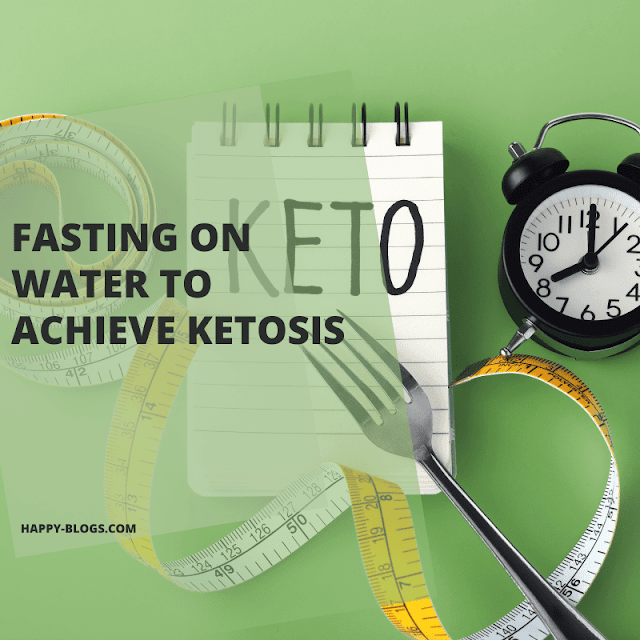Ketosis is induced by water fasting. When fasting for ketosis, you burn more fat, lower inflammation, and reduce your hunger.
You've probably heard of the Ketogenic (Keto) diet for weight loss. It is based on eating a very low carbohydrate/high fat diet, which helps the body to use stored fat for energy. Fasting can achieve the same results in less time. The longer you fast and remain in ketosis, the more benefits you will experience.
What exactly is ketosis?
When you eat at frequent intervals, your body becomes reliant on glucose (a type of sugar) to keep it nourished and operating. When this source of energy is gone, your body enters ketosis. Small molecules known as ketones that have been transformed from body fat are used as a new, alternate source of energy for both the body and the brain. Fasting is one of the various ways the body can enter ketosis.
The Advantages of Ketosis
Many studies on the benefits of ketosis are based on low-carb diets. Because fasting involves no carbs, the effects of fasting and ketosis will be comparable.
Appetite suppression: Due to a drop in the hunger hormone ghrelin, ketosis may suppress appetite.
Body shape-shifts: The body burns stored fat in ketosis, and if the body can achieve and maintain this state for longer periods of time, it results in inches and pounds lost.
Diabetes and prediabetes remission: Ketosis can aid in the improvement of insulin resistance and the stabilization of blood sugar levels.
Improved workout endurance and performance: When your body has become keto-adapted, burning fat for fuel allows for more extended, more intense exercises.
Ketosis and fasting
As previously stated, ketosis is dependent on glucose levels falling low enough for the body to make ketones, enabling it to switch to stored fat as its primary source of energy. This is exactly what happens with intermittent fasting, whether it's the 16/8, the 5:2, the alternate day, or any other strategy.
These approaches kickstart the ketosis process and are excellent long-term solutions for a permanent lifestyle. Prolonged fasting, also known as water fasting, is required if you want to achieve full ketosis and stay there for an extended period of time to reap the benefits.
When fasting, how long does it take to enter ketosis?
Fasting takes different amounts of time for different people to induce ketosis. It is determined by various factors, including how frequently you eat, your level of activity, and the number of carbohydrates you ingest. For some people, intermittent fasting ketosis might begin after 12 hours. The body is receiving the full benefits of ketosis within 24-48 hours.
Fasting on water
The majority of intermittent fasting strategies call for fasting intervals of fewer than 24 hours. Water fasting takes things a step further, eliminating all meals and allows just water to be consumed for 1-3 days. It is critical to drink at least 2-3 liters of water per day. Although many perform lengthier water fasts, you should not go past three days without medical supervision. Some people fast once a month, while others only a few times a year.
Fasting on water to induce ketosis
Water fasting causes the body to enter ketosis more quickly than Keto or other low-carb diets. All food is being withheld. As a result, the body depletes its energy supply faster and resorts to ketones and fat burning to stay going.
The Advantages of Water Fasting
The benefits of water fasting are similar to, but more pronounced than, the benefits of intermittent fasting. They include enhanced cardiovascular and brain health, as well as increased production of the "anti-aging" human growth hormone (HgH).
Fasting on water also boosts autophagy, the body's natural cell cleaning and recycling function, which reduces oxidative stress and inflammation.
Water fasting can aid in weight loss, especially when done on a regular basis. Fasting for more than three days, on the other hand, is more advantageous in this aspect.
Consider long-term intermittent fasting, possibly in conjunction with Keto or a low carbohydrate diet, to achieve and maintain the desired outcomes.
Considerations for Safety
Water fasting should be avoided by people suffering from eating disorders, pregnant women, and children under the age of 18.
Water fasting can help with gout and type 1 or type 2 diabetes, however those with these medical conditions should only fast under medical supervision.
It is normal to be irritable, but if you get dizzy or confused, stop immediately and seek medical attention.
Short-term water fasting can not create nutritional shortages, but if done repeatedly, you may find yourself lacking in vitamins, minerals, or protein. Fasts should be spaced out, and fasting supplements should be used.
Takeaway
Water fasting allows one to enter ketosis faster than other methods of achieving this metabolic state. Because the body is completely devoid of nutrition, it must rely on its own fat reserves for sustenance. Including a water fast in your diet for a few days to induce periodic ketosis offers several long-term benefits for physical and mental health, including decreased inflammation, decreased insulin resistance, and increased energy levels and mental clarity. The best weight loss outcomes can be obtained by fasting for more than three days under physician supervision.

